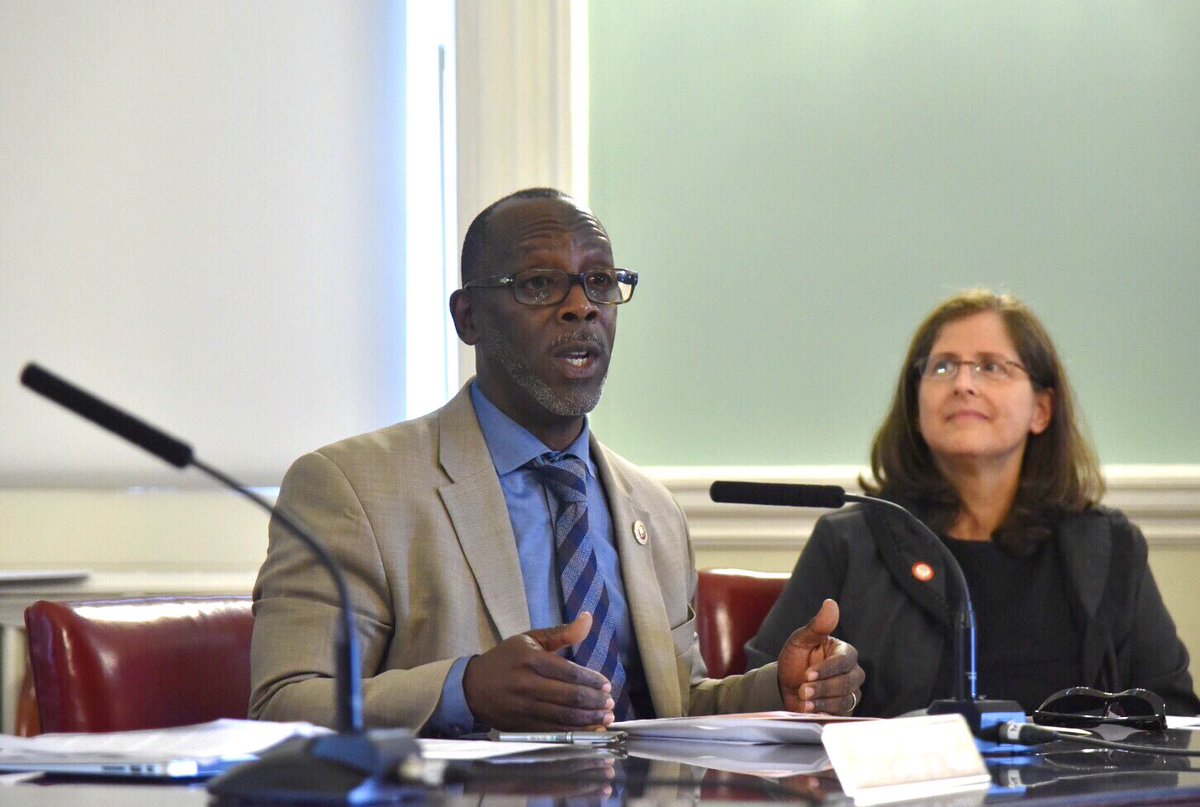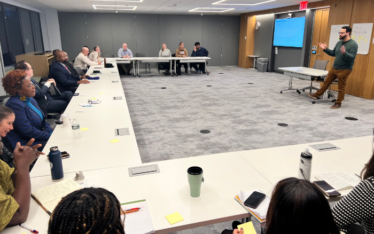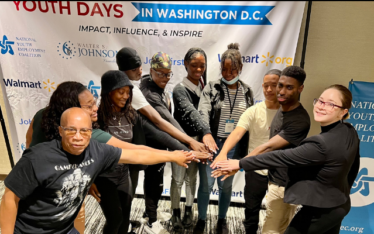Testimony of JobsFirstNYC at the New York City Council Joint Oversight Hearing before the Committee on Small Business and the Committee on Civil Service and Labor regarding an Update on Career Pathways / Workforce Development Systems on November 27, 2017 delivered by Keri Faulhaber, Vice President of Partnership and Community Engagement
Good afternoon, distinguished members of the City Council. My name is Keri Faulhaber and I am the Vice President of Partnership and Community Engagement at JobsFirstNYC. We are a practice to policy intermediary working to reduce the number of out-of-school and out-of-work young adults in New York City.
For ten years, JobsFirstNYC has been working with local communities across the 5 boroughs developing and supporting collaborative and innovative strategies to find effective solutions to support out-of-school, out-of-work young adult New Yorkers. Core to JobsFirstNYC’s approach is using the lessons learned throughout our work to inform systems-level policy needs. We welcome the opportunity to provide high-level feedback on the progress of the Career Pathways strategy and look forward to working with each of you to ensure that every young adult can access the economy and reach their fullest potential.
This testimony is focused on two critical areas: first is how the Career Pathways framework—and by extension the City of New York—does not adequately address the specific needs of the out-of-school, out-of-work young adult population. Second, is the City’s slow approach to funding and scaling effective bridge programs. Over the past five years, New York City has seen a notable decrease in the number and share of young people ages 18 through 24 who are out of school and out of work: from 22 percent (188,588 young adults) in 2010, to 17 percent (136,483) in 2015. However, the barriers faced by the remaining 136,483 young adults aged 18–24 increases the challenges to serving them.
Recent research by JobsFirstNYC (to be published in the coming weeks) has also surfaced a new set of structural challenges that New York City’s out-of-school, out-of-work population is faced with. Among them include how most job growth over the last five years has been in part-time work, as full-time jobs have decreased. And even with a tighter labor market and increased demand for labor, wages for young people have decreased. Additionally, despite higher high school graduation rates and increasing college enrollment rates, a growing number of young people are leaving college without credentials to enter the labor market with many falling into low-wage work or becoming part of the out-of-school, out-of-work population. Despite these new structural challenges as well as some persistent barriers for young adults to participate in the economic life of New York City, the City has not adequately responded with its own strategy. In fact, much of the youth workforce development discourse has been focused on programs that mostly serve in-school youth (i.e., Summer Youth Employment Program).
We recommend New York City create a comprehensive strategy that addresses the specific needs of out-of-school, out-of-work young adults. JobsFirstNYC is encouraged by the creation of the New York City Disconnected Youth Task Force and will look to this initiative as a vehicle to developing, executing, and watchdogging a citywide strategy to fully address the specific needs of New York City’s out-of-school, out-of-work young adults similar to the one the City of Los Angeles has implemented.
The Los Angeles Performance Partnership Pilot is a leading effort of the City of Los Angeles, the County of Los Angeles, Los Angeles Unified School District, Los Angeles Community College District, local Cal State Universities (CSU 5), Los Angeles Chamber of Commerce, Los Angeles Housing Service Agency, and over 50 public, philanthropic and community-based organizations to improve the service delivery system for the disconnected young adult population and connect them to the economy. This initiative—outlined in Los Angeles Performance Partnership Pilot (LAP3) 2017-2020 Strategic Plan: Serving Disconnected Youth—is an unprecedented effort in Los Angeles, and across the country, to coordinate and integrate the delivery of education, workforce, and social services to disconnected youth. Its core functions are to:
1. Align and coordinate with public and private agencies in Los Angeles to better serve youth 16-24 through the development of a platform for collaboration and exchange of best practices.
2. Increase capacity and sustainability of the regional Los Angeles Workforce Development System by developing innovative strategies and process improvements that increase and enhance service provision.
3. Champion policy and systems change to improve individual outcomes and reduce school & work disconnection.
4. Develop programs and policies that empower youth to be self-sufficient and resilient by respecting their needs and desires.
The LAP3 initiative includes targeted strategies that cut across multiple systems to serve young adults who face a variety of structural barriers. These areas include homeless and foster care, justice-involved, young adult parents, young adult immigrants, and other targeted groups. New York City has a wealth of resources and opportunities that must be coordinated, aligned, and integrated to break down barriers so out-of-school, out-of-work young adults can access them.
One glaring example of the City’s absent strategy to address the specific needs of the out-of-school, out-of-work population is reflected in the lack of urgency to effectively scale bridge program models. According to the latest Career Pathways Progress Report, the City has only invested $6.4 million into bridge strategies. This is only about 10 percent of the $60 million annual investment Career Pathways commits the city to fund by 2020 and only accounts for one year (FY16) of funding. We appreciate the City’s careful approach to systems-building and recognize this can take time and applaud the City for taking steps in the right direction. This includes launching the Building Bridges Professional Development course, which engaged more than 120 staff from 60 community-based organizations with panel presentations, workshops, site visits, resources and materials, and more. NYC Bridge Bank is another effort to build the field by creating an open-source, online platform of bridge program curricula, design manuals, teachers’ guides, and other useful resources for practitioners. However, after nearly three years of building, the time to make a significant investment in the system is now.
We recommend that the City invest $20 million to fund and scale bridge programs in the next budget year and the remaining $33.6 million the year after, which would bring annual funding to $60 million by 2020 as the City committed to in the Career Pathways plan. Importantly, we recommend the City follow the federal Workforce Innovation & Opportunity Act (WIOA) funding ratio, which dedicates 75 percent of funding to serving out-of-school, out-of-work youth. In an effort to further reduce the number of out-of-school, out-of-work young adults, we also recommend that program models serving students attending high schools with low graduation rates be included in the 75 percent funding formula. This would include the more than 15,000 students attending New York City Transfer High Schools, as they are most at-risk of becoming disconnected and unattached from school and the economy—ultimately dropping into the out-of-school, out-of-work population. Bridge programming will increase access and create a clearer career pathway for these at-risk students.JobsFirstNYC is committed to designing, testing, and scaling effective practice models that can be brought to scale through public policy. Our 10 years of experience building collaborative partnerships to serve disconnected youth provides a menu of practice models that the City should consider when building its plan to scale bridge program models across communities to ensure out-of-school, out-of-work young adults connect to a viable career path.
Key elements of effective bridge strategies can be found in the Young Adults Sectoral Employment Project (YASEP), which is one of JobsFirstNYC’s signature initiatives. YASEP utilizes a comprehensive and collaborative approach that enables “longer runways and stronger pipelines”—in other words, enough time and preparation for young adults to master the competencies necessary for success in the workplace, and sufficient employer input to ensure that participants who complete training programs are ready to contribute from their first day on the job. Two YASEP partnerships demonstrating the effectiveness of bridge programs include TechBridge and The CDI Career Academy.
Delivered in partnership with The Door and Per Scholas, TechBridge is a free-of-charge 5-week course for 18-to-24-year-olds that provides young adults with the opportunity to strengthen their professional skills, begin to establish their professional network, and gain hands on technical training. All this while developing the academic skills needed to pass the Test for Adult Basic Education (TABE) and succeed in Per Scholas’ Information Technology Support course. After successfully completing this 5-week bridge course, students directly enroll into Per Scholas’ 15-week IT Support course where they learn the necessary skills needed and prepare to earn the industry recognized certifications launching them into a career in Technology.
Another YASEP partnership demonstrating how bridge programs are a linchpin to connecting out-of-school, out-of-work young adults to economic opportunity is The CDI Career Academy, which began in 2014 as a collaboration between Comprehensive Development, Inc., The New York Alliance for Careers in Healthcare, and The Borough of Manhattan Community College. The Career Academy trains 50 young men and women each year as Certified Medical Assistant specialists. CDI Career Academy participants take part in a rigorous, seven-month college level program that was developed with input from healthcare sector employers. The program includes workforce skills and customer service training, classroom and occupational training, two days at NYU Langone’s Simulation Lab, certification, and job placement.
We greatly appreciate the opportunity to testify here today and look forward to working with each of you to ensure that all of New York City’s young adults have access to the economic life of New York City. Thank you.
We greatly appreciate the opportunity to testify here today and look forward to working with each of you to ensure that all of New York City’s young adults have access to the economic life of New York City. Thank you.





